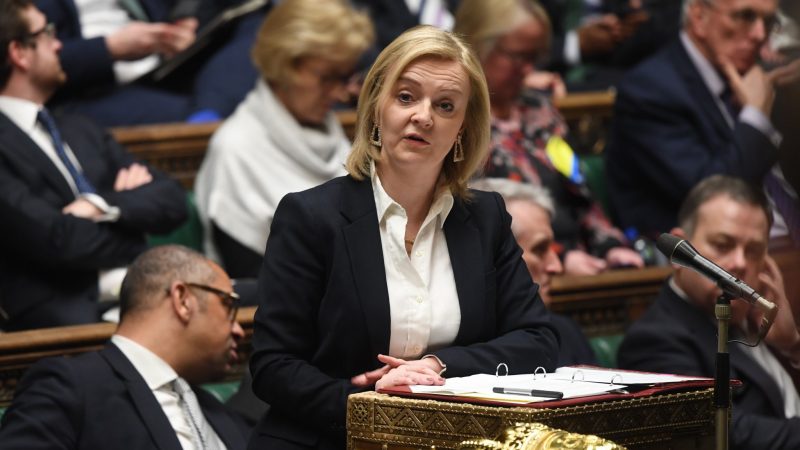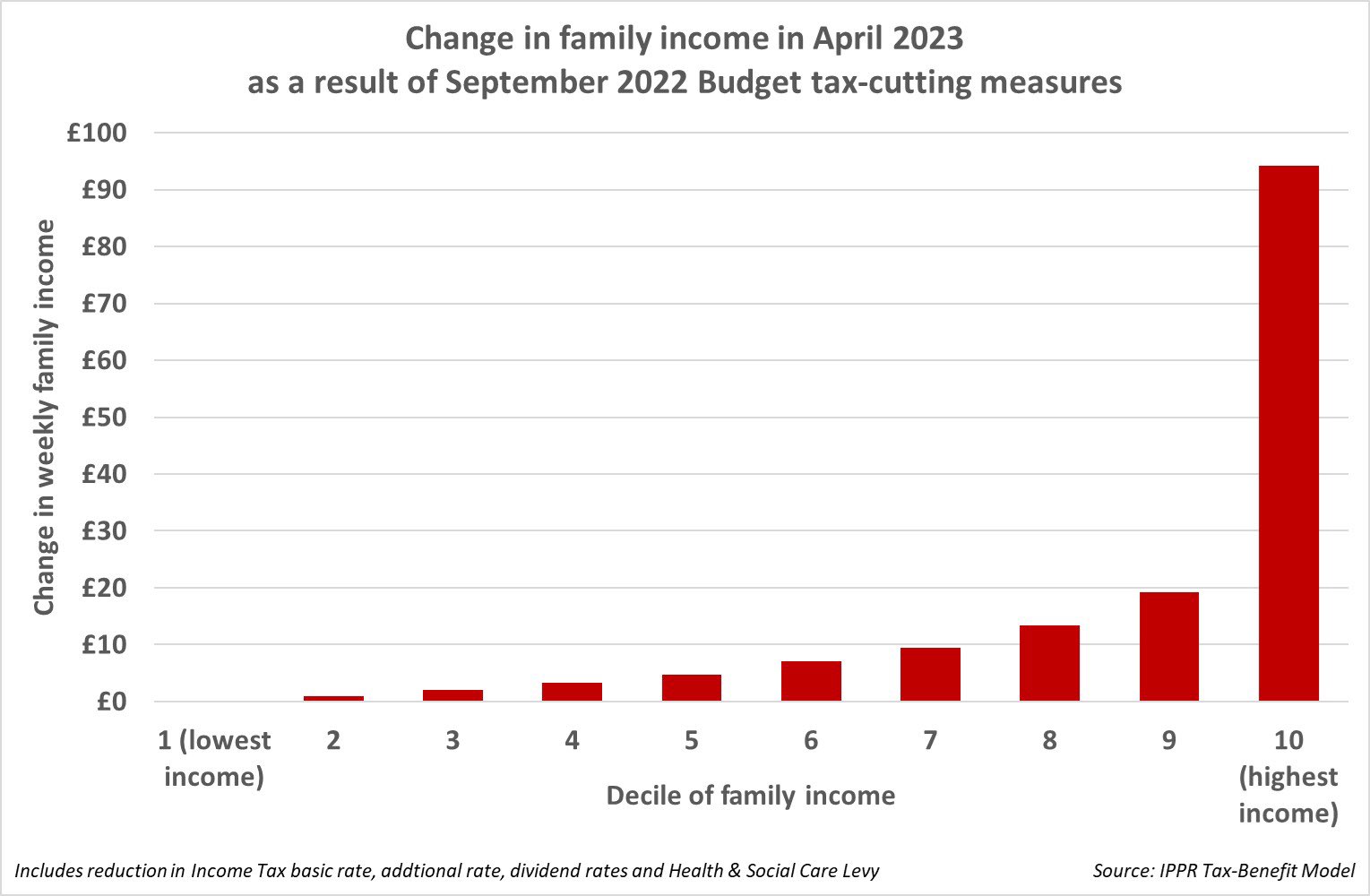
Conservative voters in Bassetlaw have voiced their concerns about the rising cost of energy, criticised the government’s decision to give tax cuts to the wealthy as “disgusting” and given their views on Liz Truss’ first weeks as Prime Minister.
In a focus group of 2019 Conservative voters, commissioned by LabourList and organised and moderated by Public First, participants reacted negatively to Kwasi Kwarteng’s mini-Budget when they were shown a graph (below) that demonstrated how wealthier households will benefit far more than those on low incomes.

Having been largely positive about the government’s focus on economic growth, a number of participants expressed anger at the Conservatives’ decision to cut taxes for the highest earners to stimulate growth.
One said they had “not really thought about it” before but that they were a “bit angrier the more we talk about it”. Another said they were also angry but added: “We’re just a small voice, aren’t we, in a big country.”
None of the seven participants said they thought that the new Prime Minister was doing a good job, though they noted that she has not been in office very long. Asked whether they would have trusted Labour to do a better job on the Budget, one responded: “What would Labour do different?”
At the end of the discussion, only one of the 2019 Tory voters said they would vote Conservative again if there was an election tomorrow. Four participants said they would vote Labour, while two remained undecided.
Bassetlaw forms part of the so-called ‘Red Wall’ group of seats – constituencies previously considered Labour strongholds. It was held by the party from 1935 until 2019, before being lost to Tory Brendan Clarke-Smith as it saw the largest swing towards the Tories.
Deputy leader of Bassetlaw council Jo White – the wife of the constituency’s former MP John Mann – has been selected to contest it for Labour.
A focus group brings together a small group of people to answer questions in a moderated setting. The group is chosen due to predefined demographic traits, and the questions are designed to provide insights on certain topics of interests.
Energy bills – “big worry at the moment”
Asked how they are feeling about the future, one participant said energy bills are a “big worry at the moment” and “still a concern” despite what the government has offered. Another agreed that energy prices are a “big worry to us all” and told the focus group that their bills were “nearly double” what they are paying currently, adding: “Your pocket only stretches so far.” They expressed hope that the Prime Minister would do more to help.
Asked whether they were worrying more than normal, one participant said: “Definitely especially with having a little one. You have to keep the house heated. It’s not fair on her not to.”
On the cost-of-living crisis more generally, one said: “Somebody’s going to have to do something to step in… or something’s gotta break I think. Something’s got to give somewhere to help us out.”
Government support measures – “giving with one hand but taking with the other”
Discussing the current state of the country, one participant said: “What gets me is every parliament since Thatcher has been promising to make us self sufficient on energy, and nothing’s come through… The next Prime Minister, she’ll promise the world, and then I think nothing else will come through again.” Another participant agreed, declaring: “Certain things that have been mentioned are going to change, but nothing ever actually does to benefit any of us.” A third also shared that view, saying: “Unless it’s negative, it never really seems to directly effect us.”
“It’s out of all our hands isn’t it,” one person said. “They’re gonna do what they’re gonna do no matter what.” Asked who they meant by “they”, the participant added: “The government, your employers.” They declared: “The knock-on effect of everything is going to affect us all, and we can’t do anything about it.”
One said: “I know my heating will not be going on as often. I’ll be putting an extra jumper on.” Another participant noted that because they are retired they are in a “better place” than some. “I feel sorry for people who are at the bottom who aren’t getting enough help,” they said. “Thousands and millions of people struggling day to day with every single aspect of their lives.”
Another argued that ministers should do “something” but added that they do not think they will or that they have the power to, as they are “at the mercy” of some of the energy companies. Another participant said the government’s plan to respond to the rising cost of energy was not enough and was “giving with one hand but taking with the other”.
Mini-Budget – “the more you earn, the more you’re going to gain”
On what they knew about the mini-Budget Kwasi Kwarteng delivered on Friday, one participant said they had heard that the top rate of tax had been scrapped and stamp duty had been reduced, which they said meant “the rich get more money, and people buying £250,000 houses plus they get a bit off”.
Shown details of the proposals set out by the Chancellor, one said: “If they’re doing all these cuts, where are they gonna get the money from to put back into the system? They say they’re helping us, but will it work out that way?” Another said the 1% cut in the basic rate of income tax, which Kwarteng announced would be brought forward to April, “was better than nothing” but added that the decision to axe the additional tax band for the highest earners meant the rich were “getting a good piece of the pie”. Another said: “The 1% to the 5%. It just seems a strange ratio to do it that way.”
On the fact that higher earners will benefit more from the plan to scrap the National Insurance rise, one participant said “it seems unfair again” as “instead of sorting it out evenly, we get a bit and they get a lot”. Another said: “It looks like the more you earn, the more you’re going to gain in your pocket… It’s better in your pocket than not in your pocket, but again it seems to be towards the higher-earner people that are gonna benefit.” They added: “Anything’s better than nothing… but where are they going to pinch it off us somewhere else?”
Asked whether it made them cross that the wealthy may benefit more than normal people from the change, one participant said: “It’s what happens. It’s what we know happens.” On whether the proposals would make them worry less about the cost of living, one said: “I don’t think you’re going to notice it, are you?” The group agreed that they felt “underwhelmed”, with one saying: “If I could afford a belt, I’d tighten it.”
Economic growth – “good idea in theory” but don’t know whether it “reaches the guy on the shop floor”
Asked whether economic growth means anything to them, much of the group said they were unsure about exactly what it is. After explaining that growth means that the economy itself grows because there is more money in the country, the moderator asked whether the participants thought growth is important. One said: “I’m sure if the economy grows then we as a country grow.” Another argued that “the more the economy grows, the more we’ve got to play with”, while a third said: “The better it is, the better it is for everybody.”
The moderator told the focus group that one of the government’s proposals to stimulate economic growth is to cut taxes for high earners so they spend more in the economy. One responded: “Good idea in theory, the trickle-down effect, but whether it reaches the guy on the shop floor or in the factory they haven’t built yet, I don’t know.” Another agreed, saying they thought that high earners would “pocket the difference” and that “they’re always going to be the ones benefitting”, though they added that they could “understand the government’s logic”. A third said: “They’re grasping at straws to be honest. They don’t know it’s going to work.” The participant declared that the government is “playing with people’s lives”, adding: “We’re all in limbo.”
Tax cuts for high earners – “angrier the more we talk about it”
When the moderator noted that no one in the group seemed particularly outraged at the idea of tax cuts for high earners, one participant said: “No, I’m angry. I wouldn’t say outraged. I’m angry. But we’re just a small voice, aren’t we, in a big country.” Another said they had “not really thought about it” before but that they were a “bit angrier the more we talk about it”.
The moderator then showed the group a graph from the Institute for Public Policy Research that revealed that the highest income households would benefit most from the changes announced by the government. Noting that the graph showed that those on the lowest incomes would get nothing, one said: “That can’t be right, can it?” Another declared: “It’s pretty disgusting.” A third said: “Why aren’t I shocked? The rich will always look after theirselves, that’s the MPs and the bankers.”
Liz Truss and Labour – “what would Labour do different?”
The moderator told participants that Labour have argued that the government’s proposals are not a plan for growth but tax cuts for the richest. One said: “It’s what it sounds like.” Another admitted they could see Labour’s point but added: “They’re always going to oppose whatever the other party put anyway.” Asked whether they would have trusted Labour to do a better job with the Budget, one asked: “What would Labour do different?”
On whether Truss is doing a good job as Prime Minister, none of the participants said yes. One said Truss has “not been in post long enough”, and another said their view of the new Prime Minister was “middling at the minute”. A third participant said the graph they had been shown left “quite a bitter taste” and noted that the tax cuts had been announced during Truss’ time in office.
The study in Bassetlaw forms part of a series of focus groups commissioned by LabourList and carried out by Public First, bringing you insights from key constituencies across the country as we approach the next general election.




More from LabourList
Government announce SEND reform in schools white paper
SPONSORED: ‘Industrial hemp and the challenge of turning Labour’s priorities into practice’
‘A day is a long time in politics, so we need ‘action this day’’